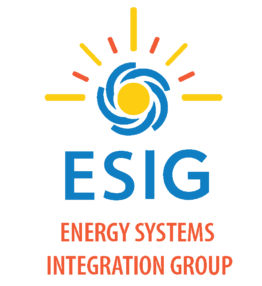Renewable energy in many systems is starting to hit significant levels and there are very ambitious targets. For example, in 2017 Denmark hit 43.4% of electricity from wind and Denmark has a target of 50 % of energy from renewables by 2030. Three New England states representing most of the region’s energy demand have committed to an 80% reduction in greenhouse gases by 2050. New York State’s Reforming the Energy Vision requires 50% of electricity by 2030 to be generated by renewable sources. Cities such as Los Angeles are working towards 100 % renewable future, and the State of California has signed into law a requirement that 100% of its electricity be provided from carbon-free sources by 2045.
Getting to high shares of renewables in electricity and/or the energy system more broadly will involve the electrification of other sectors. This will change the role of the electricity system within high share renewable energy systems and it is important to understand what sectors and to which extent should be electrified.
This trend in high share of renewable energy has led to significant policy and research interest in 100% renewable energy systems and will require engineering and market innovation coupled to societal change at scale. There is a great need for careful analyses of the technologic and economic questions to address practical implementation issues based on state-of-the-art knowledge in power engineering and other disciplines. This special issue intends to address this gap by focusing on realistic systems at scale.
The topics of interest include
- High renewable share studies at scale
- Low and zero inertia renewable electricity systems
- Market design in high renewable share energy systems
- Impact of electrification and efficiency on high shares of renewable energy
- Technical and economic aspects of flexibility in energy systems with high shares of renewable energy
- City and regional scale high share initiatives
- Engineering, economic, regulatory, policy and societal implications of high shares of renewables
- Energy vector coupling to achieve high share of renewable energy
Guest Editorial Board
| Mark O’Malley, NREL (and UCD) Guest Editor in Chief | |
| Mark Ahlstrom, NextEra Energy, USA | Hannele Holttinen, VTT, Finland |
| Valentin Bertsch, DLR, Germany | Tim Green, Imperial College London, UK |
| Nicos Cutululis, DTU, Denmark | Juha Kiviluoma, VTT, Finland |
| Chris Dent, University of Edinburgh, UK | Henrik Madsen, DTU, Denmark |
| William D’haeseleer KU Leuven, Belgium | Nick Miller, Retired |
| Erik Delarue, KU Leuven, Belgium | Lenart Soder, KTH, Sweden |
| Ben Hobbs, John Hopkins University, USA | Charlie Smith, Energy Systems Integration Group |
| Jonathan O’Sullivan, EirGrid, Ireland | Debra Lew, GE |
| Aidan Tuohy, EPRI | Goran Strbac, Imperial College London |
| Vera Silva, General Electric, France | Paul Denholm, NREL, USA |
Important dates
- February 1, 2019: Deadline for extended abstract submission – two pages maximum, emailed to 100ieeepwrs@gmail.com
- April 1, 2019: Notification for full paper submission
- August 1, 2019: Deadline for full paper submission
- February 1, 2020: Final decision notification
- Mar 1, 2020: Publication material due
- Target publication: Q3 2020
Editor in Chief of IEEE Transactions on Power Systems: Nikos Hatziargyriou

Leave a Reply